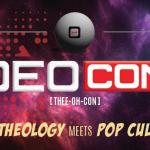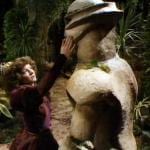I started one session of my Religion and Science Fiction class this past week with music. Here is the playlist I had lined up in advance:
Sydney Carter, “Every Star Shall Sing A Carol”
Chris DeBurgh, “A Spaceman Came Traveling”
Larry Norman, “UFO”
Styx, “Come Sail Away”
There is also a video with a reading of the poem “Christ in the Universe” by Alice Meynell which is among the texts students read for today. Students agreed with me that a poem by a British poet ought to be heard read with a British accent.
Students were not asked to read any of the above song lyrics or to listen to them prior to class. I played them at the start of class and pulled the lyrics up on the screen as we did so, highlighting some of the lyrics. The starship crew mistaken for angels in “Come Sail Away.” Jesus dying for aliens in Larry Norman’s song. Not only the integration of a spacecraft into the Christmas story by Chris DeBurgh but the fact that the behavior of the “star” in the story is a better fit to a spaceship than a literal star. We talked about the fact that angels were inhabitants of the celestial realm in ancient thought and so there is something fitting, if also something problematic, about making this kind of substitution.
However, I missed that there was something else that ought to be included, something that would turn out to provide the absolutely perfect framing for the topic. Thankfully a student provided it. When I asked if students were aware of any examples of music at the intersection of religion and science fiction they didn’t come up with any of the above. Instead, one suggested the episode from Star Trek: The Original Series, “The Way to Eden,” and more specifically, the musical space hippies. So we watched this before any of the above that I had prepared for us to listen to:
The reason I think that provides a perfect framing for the discussion as a whole is the fact that from our vantage point of hindsight, the space hippies seem so thoroughly a product of the past era that produced them, even as they were supposed to be part of a vision of the future. When we think about the supposed inevitability that the future will be more secularized, that as we travel into space we will have less religious expression accompanying us, is that perhaps also something that someone a century from now would view much as we do the space hippies, as something that seemed like a long-term trajectory at one point but comes to seem quaint and dated? Science fiction helps us think about such things. I mentioned to students one project I sometimes suggest students do, namely to draw one of those stereotypical timelines of the church and its history, but with the timeline continued into a science fictional future. Imagining what human religions might look like in the year 3,000, as practiced on space stations and Mars as well as Earth, can help us to think beyond the confines of our own historical moment, even though in reality we will nonetheless imagine the future in ways determined by our era and historical circumstances.
What is your favorite example of music at the intersection of religion and science fiction? What others have I missed that I ought to include in the future?
Let me also mention (since I have provided so much video content in this post) there’s a relevant episode of ‘Religion for Breakfast’ which will clue you in to the theme we explored through short stories as well as the musical selection above:
The next class will shift our focus to time travel. Interestingly, there is a musical connection that can be made here too. The Mike & the Mechanics song “Silent Running” actually has nothing to do with the science fiction movie of the same name, but does envisage a sci-fi scenario involving time travel!













